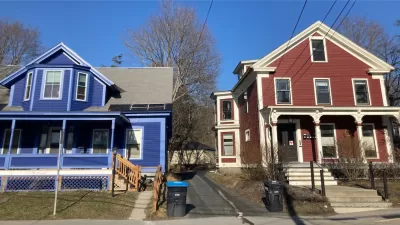Sets of pre-approved housing plans can lower construction costs, shorten timelines, and encourage more badly needed housing production.

As more cities turn to pre-approved ‘housing catalogs’ to streamline permitting processes and stimulate more housing production, Molly Bolan describes the not-so-new concept in Route Fifty. As Bolan explains, “In the early 20th century, Sears, Roebuck and Co. published catalogs with home designs. Customers could choose a plan and send away for the materials to build their ‘kit home.’”
In recent years, cities such as Los Angeles, Sacramento, and Stockton have developed their own catalogs of pre-approved plans for accessory dwelling units (ADUs) and other ‘missing middle housing’ types aimed at reducing costs for homeowners and making it easier to build new housing units.
The Sears Catalog homes inspired the city of South Bend, Indiana to create a “catalog of pre-approved plans for infill housing in an effort to incrementally increase housing stock in their neighborhoods without fundamentally changing the character of those communities,” says Tim Corcoran, the city’s community investment planning director. According to Corcoran, “The plans are geared to smaller lots that are common in cities, rather than the larger plots that exist in the suburbs.” The city hopes the catalog will lower ‘soft construction costs’ and incentivize more housing construction.
FULL STORY: ‘Housing Catalogs’ Make a Comeback

Maui's Vacation Rental Debate Turns Ugly
Verbal attacks, misinformation campaigns and fistfights plague a high-stakes debate to convert thousands of vacation rentals into long-term housing.

Planetizen Federal Action Tracker
A weekly monitor of how Trump’s orders and actions are impacting planners and planning in America.

In Urban Planning, AI Prompting Could be the New Design Thinking
Creativity has long been key to great urban design. What if we see AI as our new creative partner?

King County Supportive Housing Program Offers Hope for Unhoused Residents
The county is taking a ‘Housing First’ approach that prioritizes getting people into housing, then offering wraparound supportive services.

Researchers Use AI to Get Clearer Picture of US Housing
Analysts are using artificial intelligence to supercharge their research by allowing them to comb through data faster. Though these AI tools can be error prone, they save time and housing researchers are optimistic about the future.

Making Shared Micromobility More Inclusive
Cities and shared mobility system operators can do more to include people with disabilities in planning and operations, per a new report.
Urban Design for Planners 1: Software Tools
This six-course series explores essential urban design concepts using open source software and equips planners with the tools they need to participate fully in the urban design process.
Planning for Universal Design
Learn the tools for implementing Universal Design in planning regulations.
planning NEXT
Appalachian Highlands Housing Partners
Mpact (founded as Rail~Volution)
City of Camden Redevelopment Agency
City of Astoria
City of Portland
City of Laramie





























